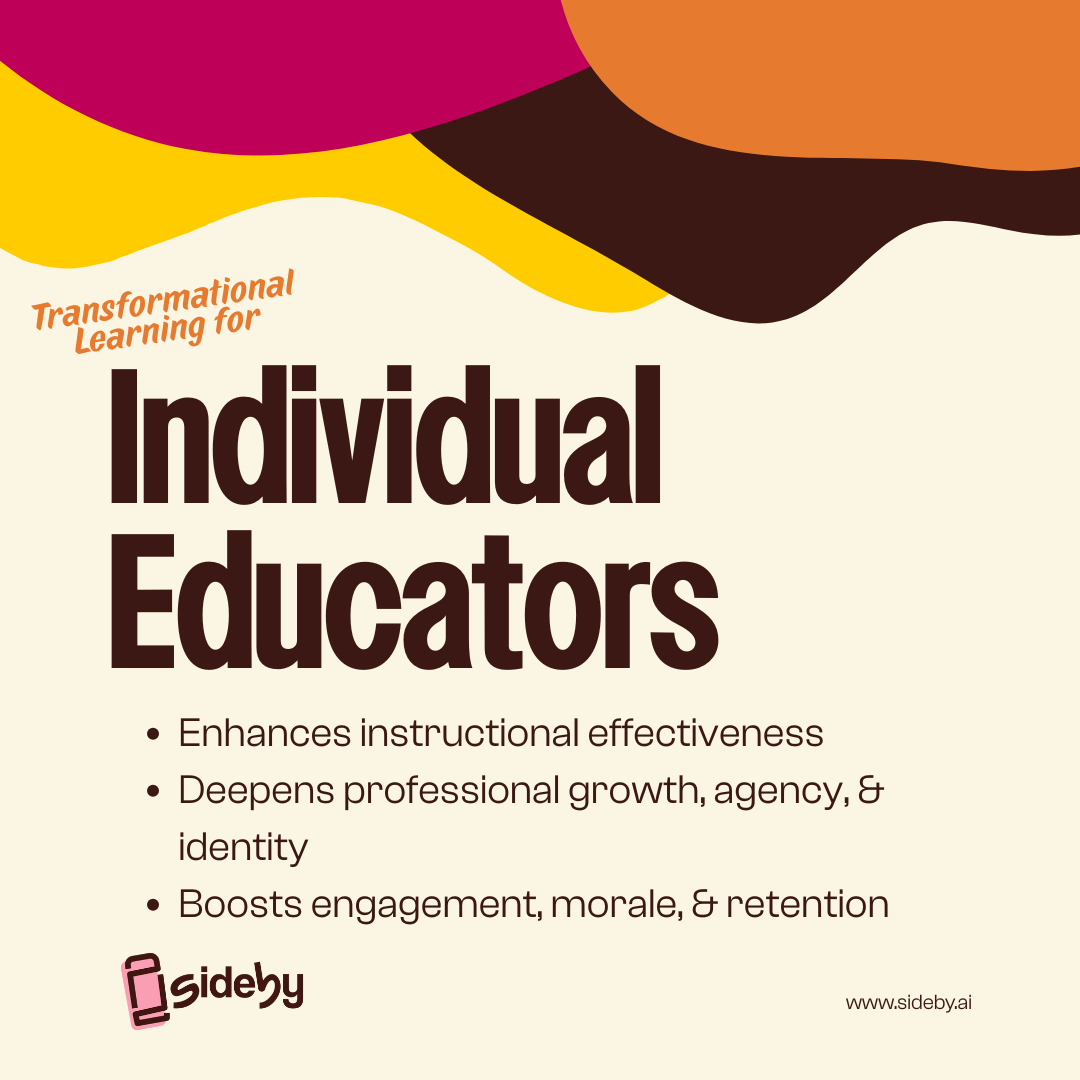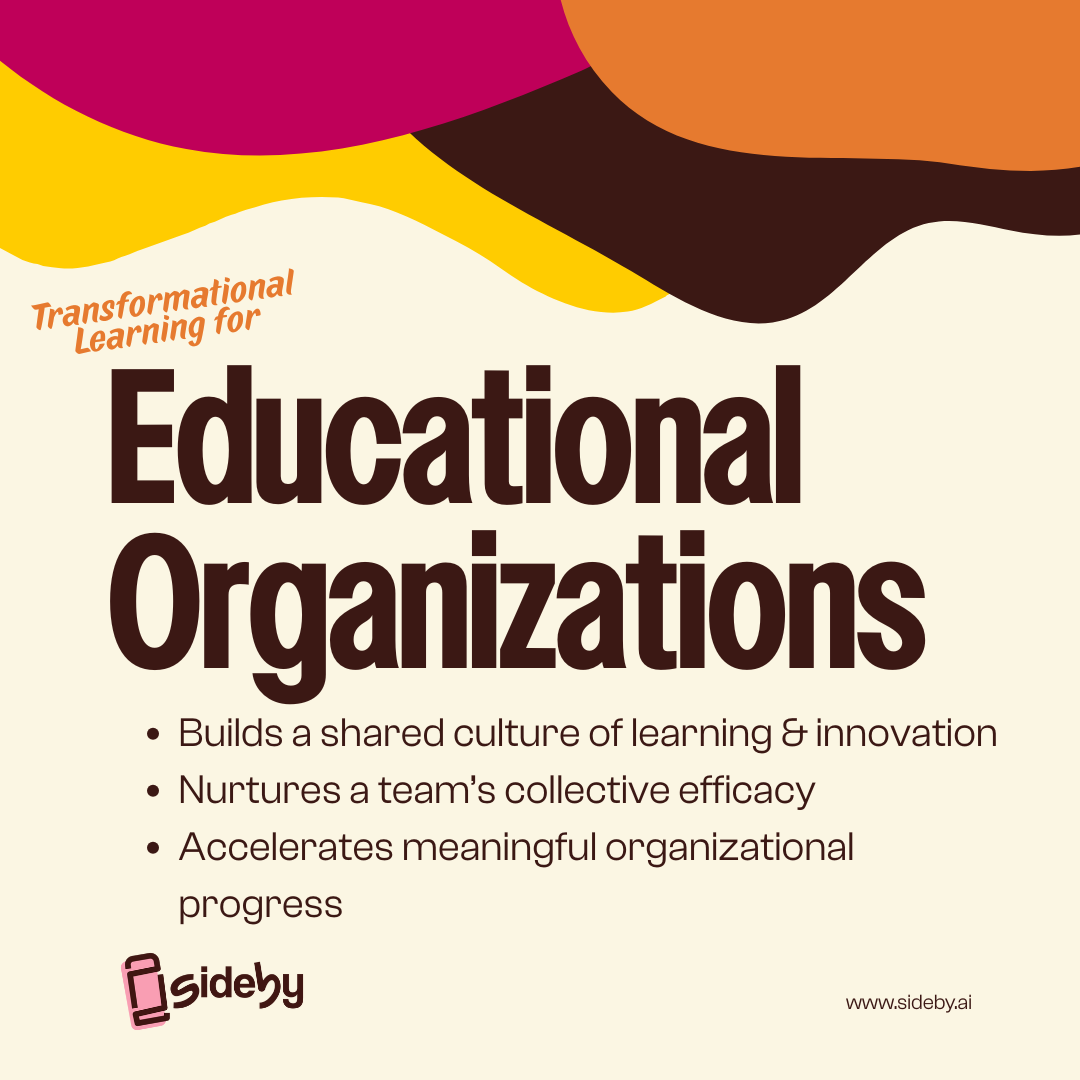The Impacts of Transformational Learning for Educators
By Kippy Smith and Erica Crane, EdD
TL;DR
Schools spend heavily on professional development, but results depend on the approach.
One-off workshops rarely stick. Transformational PD does.
It drives real growth, shifts culture, and empowers educators.
sideby and the Small Wins Dashboard make that growth visible and lasting.
School districts invest significant funds into professional development – up to $8,000 per teacher annually (Bocala & Richardson, 2019). Is it worth it?
It depends: research suggests the type of professional development educators engage in notably influences its effectiveness. Educators know this firsthand. The most common form of professional development that educators engage in is one-time teacher workshops, even though research suggests this is less effective than sustained, job-embedded professional development (Gates Foundation, 2014). This is what we call transformational professional development. This is what we believe in because we’ve experienced it, facilitated it, and endured the opposite.
School and district leaders aiming to cultivate inclusive, future-ready schools should prioritize transformational professional development because it pays dividends. Unlike compliance-driven trainings, transformational learning creates durable, adaptive growth aligned to educators' real needs. It nurtures leadership at every level of the system and supports sustainable improvement within both the individual and organizational spheres.
Recap: Definition of Transformational PD
Transformational PD moves beyond technical skill-building to fundamentally shift how educators see themselves, their work, and their role in shaping schools. As we previously described in our first blog post of this series, transformational learning involves a deep, irreversible change in thinking, acting, and being. Through processes like critical reflection, peer dialogue, and authentic practice, educators engage in learning that is relevant, empowering, and sustaining.
Impact of Transformational Professional Development on Educators
Research shows that transformational PD positively impacts educators in the following areas:
Enhancing Instructional Effectiveness. Transformational professional development improves instructional practice by helping educators reflect on and refine their teaching in response to the specific needs and strengths of their students and context. It does this by integrating core features identified by Darling-Hammond et al. (2017) as most effective: active, hands-on learning; ongoing support embedded in educators’ daily work; and structured opportunities for reflection and feedback. These elements make the learning more relevant and sustainable, contributing to improved teaching and student outcomes.
Supporting Professional Growth, Agency, & Identity. Educators engaged in transformational PD build a self-sustaining learning mindset, or what Cranton (2006) describes as a disposition toward continuous reflection, learning, and adaptation. Cranton (2006) goes on to explain that this mindset stems from a process in which learners critically examine their assumptions, engage in reflective discourse, and act upon their revised beliefs. According to Brookfield (2000), transformative learning allows educators to uncover and revise unconscious assumptions about teaching. This approach supports teachers not only in acquiring new practices but in deepening their professional identity and agency. Biesta et al. (2015) highlight the importance of agency in professional learning, showing how it enables educators to make meaningful choices and pursue purposeful change.
Boosting Engagement, Morale, & Retention. In an era marked by burnout and teacher shortages, transformational PD is a critical lever for morale and retention. When PD honors teacher voice and builds relevance through authentic challenges, educators report higher levels of engagement and fulfillment. Darling-Hammond (2022) argues that to improve retention, schools must invest in professional learning that is collaborative, job-embedded, and focused on solving problems of practice, which fosters educator satisfaction and commitment. By creating space for shared reflection and growth, transformational PD fosters trust and emotional investment in the profession. This is also about basic teacher respect and honoring the teacher as a professional learning expert. This is echoed in hooks (1994, 2010), who writes about the joy and liberation that come from reclaiming learning as a form of freedom and critical consciousness.
Impact of Transformational Professional Development on Organizations
Transformational PD has ripple effects beyond individual teachers. It yields positive outcomes at the organization level, in addition to the individual educator level:
Shaping Positive Organizational Culture. Wenger (1998) contends that when people engage in shared learning around meaningful practice, they form "communities of practice" that generate shared identity, norms, and innovation. EL Education (2018) echoes this, noting that collaborative adult learning is central to sustaining a shared school vision and coherent practices. When educators learn in peer-driven, inquiry-based communities, they co-create new norms, build collective efficacy, and shift school culture (Wenger, 1998). Transformational PD can anchor a culture where experimentation is valued, equity is centered, and change is owned collectively rather than imposed. Such a culture nurtures a team’s collective efficacy, which can be a powerful, renewable resource.
Improving Organizational Progress. When individuals and teams reflect on and learn from the everyday effects of their efforts, they don’t just become “busier,” they become more effective. This reflective practice, a key component of transformational learning experiences, builds intrinsic motivation and strengthens a team’s capacity to move work forward meaningfully. Research by Amabile and Kramer (2011) on The Power of Small Wins highlights what they call the Progress Principle: The more often people experience a sense of progress, the more likely they are to sustain creative, effective contributions over time. This principle applies to organizations as well. When teams routinely learn from the effects of their collective efforts, progress becomes part of the organizational culture, leading to greater alignment, momentum, and impact. It’s not about chasing maximum productivity at all costs, it’s about creating the conditions where progress is visible, valued, and reinforced through continuous learning.
Transformational Examples from the Field: Small Wins Dashboard and sideby
Small Wins Dashboard and sideby are promising edtech models developed by educators with a foundation in transformational approaches to learning. Educators and instructional leaders consistently note that these platforms embody key principles of research-based transformative adult learning.
sideby is a professional learning platform that facilitates personalized, peer-driven dialogues grounded in real instructional challenges. Educators identify goals, explore promising practices, and reflect on shifts in mindset and strategy through sideby's guided conversations and learning journeys. It’s student-led and student-centered learning for adults (Berger et al., 2014). On sideby, educator expertise is honored in a learning community meant to amplify and support the real work of teachers and education leaders toward more learner-centered classrooms. Right now, the emphasis is on learning AI in education.
The Small Wins Dashboard complements this by providing a way to visualize ongoing learning and growth. Teams of educators track their shared goals by routinely reflecting on observations and experiences, in the form of Small Wins. They ground their reflections in research-based Success Signs – observable behaviors that signal whether an educator is on track toward their big goals. The result is team-generated, real-time evidence of growth that catalyzes dialogue and authentically functions as a source of team knowledge and learning. This structure supports the kind of reflective storytelling and change-over-time analysis that Cranton (2006) identifies as central to transformative learning. It’s also aligned to more community-driven continuous improvement for equity (Caillier, 2022; Hinnant-Crawford, 2025) and street data (Safir & Dugan, 2021). As one education leader states, “The Small Wins Dashboard provided each educator with a tool to recognize for ourselves our own achievements and even mindset shifts. This was truly a way for the teachers to make meaning for themselves and also collectively, as a community. It enabled self-recognition and change. I would argue this is true empowerment: being able to name the achievements, the successes, the practices that underlie those successes, for yourself.” That’s why focusing on small wins matters.
Together, these tools embody the values of relevance, agency, reflection, and equity that define transformational professional development. As Freire (1970) asserts, true education is emancipatory and it equips people to reflect and act to change their world. This is what an investment in transformational professional development can do: lead to sustained growth in teaching and learning in schools.
References
Berger, R., Rugen, L., & Woodfin, L. (2014). Leaders of their own learning: Transforming schools through student-engaged assessment. Jossey-Bass.
Biesta, G., Priestley, M., & Robinson, S. (2015). The role of beliefs in teacher agency. Teachers and Teaching, 21(6), 624–640. https://www.tandfonline.com/doi/full/10.1080/13540602.2015.1044325
Bocala, C. & Richardson, D. (2019, June 1). Supporting Districts’ Efforts to Evaluate Professional Development. Institute of Education Sciences, U.S. Department of Education. Retrieved from https://ies.ed.gov/learn/blog/supporting-districts-efforts-evaluate-professional-development
Gates Foundation. (2014). Teachers Know Best: Teachers’ Views on Professional Development. Retrieved from https://usprogram.gatesfoundation.org/-/media/dataimport/resources/pdf/2016/11/gates-pdmarketresearch-dec5.pdf
Brookfield, S. D. (2000). Transformative learning as ideology critique. In J. Mezirow & Associates (Eds.), Learning as Transformation. Jossey-Bass.
Caillier, S. (2022, June 8). Improvement as a tool for our collective liberation, with Dr. Brandi Hinnant-Crawford. hthunboxed, S3E17. https://hthunboxed.org/podcasts/s03e14-improvement-as-a-tool-for-our-collective-liberation-with-dr-brandi-hinnant-crawford/
Cranton, P. (2006). Understanding and Promoting Transformative Learning. Jossey-Bass.
Darling-Hammond, L., Hyler, M. E., & Gardner, M. (2017). Effective Teacher Professional Development. Learning Policy Institute. https://learningpolicyinstitute.org/product/effective-teacher-professional-development-report
Darling-Hammond, L. (2022). Breaking the legacy of teacher shortages. Educational Leadership, 80(2), 14–20. https://www.ascd.org/el/articles/breaking-the-legacy-of-teacher-shortages
EL Education. (2018). Core practices: A vision for improving schools. https://eleducation.org/resources/core-practices-updated
Freire, P. (1970). Cultural action and conscientization. Harvard Education Review, 40(3), 452-477. https://www.proquest.com/docview/212259583/30C7D4B659524316PQ/3?sourcetype=Scholarly%20Journals
Hinnant‑Crawford, B. N. (2025). Improvement science in education: A primer (2nd ed.). Myers Education Press.
hooks, b. (1994). Teaching to transgress: Education as the practice of freedom. Routledge.
hooks, b. (2010). Teaching critical thinking: Practical wisdom. Routledge.
Safir, S. & Dugan, J. (2021). Street data: A next-generation model for equity, pedagogy, and school transformation. Corwin.
Wenger, E. (1998). Communities of Practice: Learning, Meaning, and Identity. Cambridge University Press.
Frequently Asked Questions
Is professional development really worth the cost for schools?
Yes, but only if it’s the right kind. Research shows that sustained, job-embedded professional development—what we call transformational PD—has far greater impact than one-time, compliance-based sessions.
What is transformational professional development?
Transformational PD goes beyond surface-level skills. It changes how educators think, act, and lead by centering reflection, peer learning, and real-world relevance.
How does transformational PD benefit teachers?
It boosts instructional effectiveness, builds agency and professional identity, and increases morale and retention by honoring teacher voice and treating educators as expert learners.
What impact does transformational PD have on schools and systems?
It cultivates a strong, collaborative school culture, aligns teams around a shared vision, and improves collective performance. The result: empowered educators and more effective schools.
Why are tools like sideby and the Small Wins Dashboard effective for transformational PD?
They turn theory into practice. sideby structures meaningful, peer-driven conversations along learning pathways. The Small Wins Dashboard makes learning visible by tracking growth in real time, supporting reflection, ownership, and continuous improvement.



